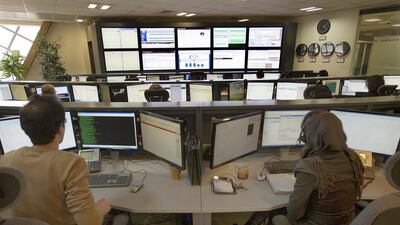TEHRAN // Social media websites are banned in Iran but that does not appear to apply to everyone.
The Islamic Republic’s supreme leader has two Twitter accounts and is an avid user of Instagram. The foreign minster uses Facebook to post his latest movements and has his own YouTube channel. And the president’s Twitter account has more than 180,000 followers.
But it is not just the country’s leaders who enjoy the benefits of banned social media. Across the country young people in particular are keen users, using virtual private networks (VPNs), which are illegal, but still easy to download and use to bypass the state’s vast internet filtering system.
The glaring contradiction came into focus recently when Ali Jannati, the minister of culture and Islamic guidance, declared that with four million Iranians on Facebook, the country will not be able to ban social media forever. The country needs to update internet regulations for modern times, the reform-minded Mr Jannati said.
But as Iran edges towards a new political atmosphere, attempts to improve internet freedoms are colliding with hardliners who believe they must protect the Islamic Republic from western influences.
Access to social media and many other websites that are deemed immoral, or undermining to the establishment are currently barred.
The filtering of websites like Facebook and Twitter began after the disputed 2009 presidential election, during which many Iranians used social networks to orchestrate street protests.
In a cafe in western Tehran that serves as a popular hangout for young Iranians those restrictions appear to have little affect.
While sipping coffee and browsing the internet via various laptops, smart phones and tablets, the patrons share information about technology and discuss the latest app to download.
“We use Facebook for communication,” said Ahmadreza, 32, as he used his i-pad to flick through the latest status messages posted by his friends.
“I do not understand why they are pushing us to live in a cave. Their method doesn’t work anymore,” he said referring to the restrictions imposed by the authorities.
Mr Jannati, the son of a conservative cleric, signed up for Facebook three years ago and is ready to acknowledge the changes in Iranian society.
He even described most of the media restrictions imposed after Iran’s 1979 Islamic revolution, such as banning fax machines and video players, as “ridiculous”.
“We cannot restrict (technology’s) advance under the pretext of protecting Islamic values,” Mr Jannati said during a meeting at Iran’s chamber of commerce.
His comments sparked a quick response from Iran’s conservatives.
“We do not have any plans to unfilter websites such as Facebook,” Abdolsamad Khoramabadi, a prominent hardliner, told local media earlier this month,.
Decisions regarding the filtering of websites are beyond the control of the administration of president Hassan Rouhani, who, is considered a moderate.
Instead, such decisions rest with a 13-member task force called The Committee for Identifying Instances of Criminal Content. Known as the “Filtering Committee”, it holds the power and responsibility to decide on filtering.
The commitee is an independent unit comprising of 6 ministers, a few lawmakers, and members of the judiciary.
Although six of the committee’s members are ministers in Mr Rouhani’s government , they do not have the last say on the issue. Power over the committee rests with members of the judiciary and conservative legislators.
The filtering does have some support among the Iranian population.
“I do not use any of these social networks, because their content is opposed with our Islamic beliefs and people have used them against their ruling system,” said Amirali, 34, a mechanical engineer from eastern Tehran.
But the apparent popularity of social media among most young people suggests that attempts to limit access to the websites and other new technologies are unlikely to succeed.
Already, 60 per cent of Iranian university students use digital communication services such as Viber and WeChat, according to Iran’s ministry of sciences. In December, Iran began blocking WeChat, which is among the top five smartphone messaging apps in the world.
And the benefits of social media is acknowledged at the highest levels of Iran’s government with foreign minister Mohammed Javad Zarif attracting 85,000 followers on Facebook. He regularly posts updates about his travels and diplomatic affairs and often receives hundreds of comments in response.
The president’s @HassanRouhani Twitter feed has updates from last week including postings about a phone call with Vladimir Putin and his visit to Oman. Ayatollah Ali Khamenei has two Twitter accounts. His English account has more than 46,000 followers while the Farsi account has 3,570.
Twice since Mr Rouhani took office last August, access to Facebook and Twitter was unblocked for several hours.
While campaigning for the presidency ahead of his election last year, Mr Rouhani promised to increase social freedoms. But it is unclear whether the brief stops in filtering were deliberate or a technical glitch.
“We should believe in miracles, it happened,” a 35-year-old Iranian woman named Firouzeh posted on Facebook during the brief break in filtering earlier this month. “Nowadays internet and social media are like books: humanity’s best friend, then we are deprived of them.”
foreign.desk@thenational.ae

